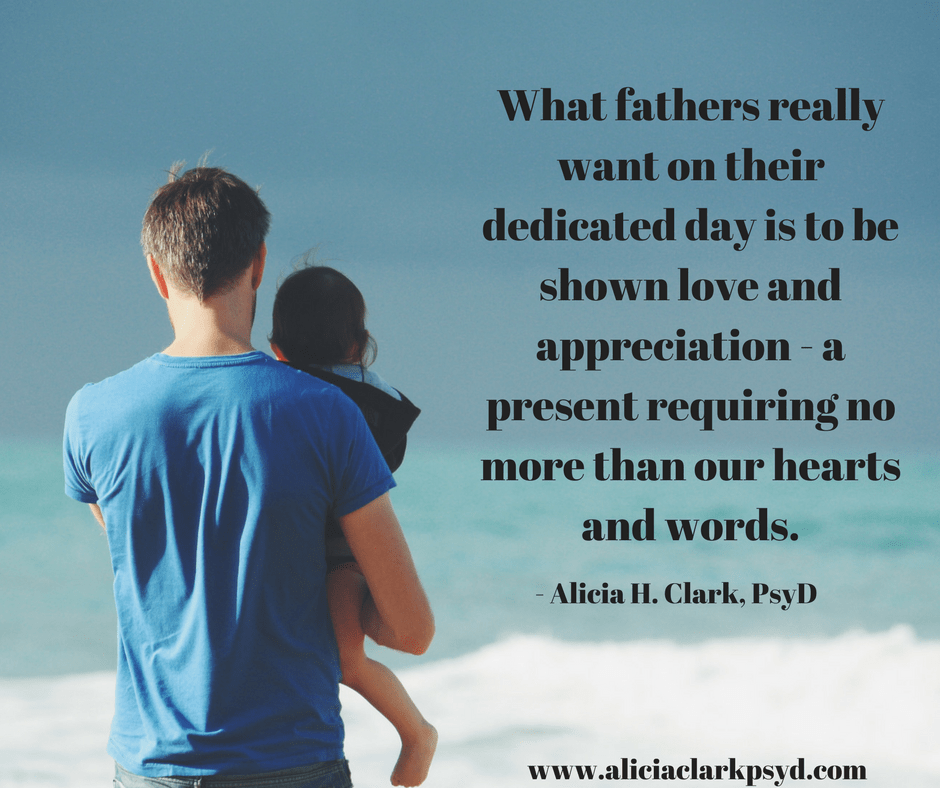A Surprising Approach to Father’s Day: What Dads Truly Want

Searching for that perfect present for Father’s Day? A tie? A new set of golf clubs? Tickets to a baseball game? These are some of the many stereotypical Father’s Day gifts we all may be scrambling to purchase this week. But is that what Dad really wants, or what will make him happy?
Maybe not. Science has demonstrated that we are happiest when we feel valued and loved, something that makes sense given that, as social beings, we thrive in connection. Humans, male and female, have a core drive to love and be loved.
This idea goes beyond the notion that money can’t buy you love – rather, it’s that money can’t show love. What fathers really want on their dedicated day is to be shown love and appreciation. This special present requires we look no further than our hearts, and our words.
Gratitude is as good for us to give as it is good for Dad to receive, and it can be as simple as saying, “thank you.”
Here are a few ways that gratitude is particularly relevant to families, and Father’s Day.
Gratitude works its magic in a myriad of ways we are only starting to understand. Here are a few that particularly relate to families.
1) Gratitude is good for all of us. According to the Greater Good Science Center at the University of California, Berkeley, expressing gratitude leads to a plethora of scientifically-proven benefits including “stronger immune systems and lower blood pressure; higher levels of positive emotions; more joy, optimism, and happiness; acting with more generosity and compassion; and feeling less lonely and isolated.” The research is so appealing that UC Berkeley, in collaboration with UC Davis, is embarking on a $5.6 million, 3-year study to explore the effects of gratitude on a large scale. Saying thank you to Dad at any age is good for him to hear, and good for us to say.
2) Gratitude reinforces empathy in kids. Children are naturally narcissistic, and sometimes need parental help in cultivating empathy. Understanding other people’s feelings and needs is an important growth edge in developing relationship skills. Father’s Day presents a great opportunity for children to think about what it’s like to be Dad, what he does for them, how he feels about them, and what he teaches them. Putting themselves in Dad’s shoes affords a glimpse into his experience, and together with their love for him creates a template for expressing gratitude and appreciation to him.
3) Gratitude strengthens relationships. When mom says thank you to dad for his fathering, dad feels acknowledged and appreciated from his co-partner in parenting. He feels noticed. He feels needed. And when the children see and hear mom thank dad, they feel family unity.
4) Prioritize “packaging” gratitude for Dad. Father’s Day can easily get lost in the shuffle of school ending, and family schedules changing. Kids feel most comfortable when they have time to think, and then execute. Moms can help them prepare for Father’s Day by dedicating time and space for her and the children to write out what they’re thankful to Dad for, and perhaps prepare a gift to show their appreciation. But again, the focus is the words, not the gift.
5) Gratitude is born from love. When we stop to consider the investment required of us as parents, and why do we do it, only one answer really emerges: Because we love our children. When we love somebody, we want to give, and we want to do. Love brings out this altruism. And the words “thank you” say “you’re doing a good job loving me.” A genuine thank you is a form of praise, and receiving praise is equated with the same brain activity as receiving cash in hand, according to a 2012 Japanese physiological study.
As parents, and perhaps as people, love and appreciation is all we really want, and appears to be a cornerstone of happiness. By teaching our children to be thankful for their parents’ efforts, we give them the gift of gratitude, further cementing their relationship with us, and enabling us to feel like our efforts are appreciated. And by saying thank you to our own partners, we nurture our relationship as partners, and crystallize our roles as parents.
Showing love and saying thank you to Dad on Father’s Day solidifies what he wants most – our love and admiration. You are never too old to say thank you to Dad. Your words might just be the best present you can give him.
Looking for more help with parenting and relationships? Learn more about my book Hack Your Anxiety and access free tools to help you manage the fear and anxiety going around the world today.
Hi Alicia,
We all love a heartfelt thank you. It means so much more than just about anything.
My kids have given me lots of gifts over the years but none of them has made me happier than when they say ” You’ve been a great mom and I just want to thank you for all you do”.
Blessings,
Elizabeth 🙂
Thanks Elizabeth for taking the time to comment.
I completely agree! Those hand-written notes from our kids are priceless.
All the best,
Alicia
Thank you, Alicia!
You too are “a part of this day.”
Having been a Mom-Dad ( became a widow while expecting my daughter and best friend) I received LIFE’s best prize!!
So true: a little word that associates gratitude, feels so good.
Best wishes to all.
GMF
Thanks Gaby for your kind comment, and inspiring story. So glad the post resonates. Hope you have enjoyed this well-deserved day of recognition.
All the best,
Alicia